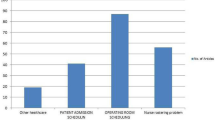Abstract
This paper deals with single-machine scheduling problems with a more general learning effect based on sum-of-processing-time. In this study, sum-of-processing-time-based learning effect means that the processing time of a job is defined by a decreasing function of the total normal processing time of jobs that come before it in the sequence. Results show that even with the introduction of the sum-of-processing-time-based learning effect to job processing times, single-machine makespan minimization problems remain polynomially solvable. The curves of the optimal schedule of a total completion time minimization problem are V-shaped with respect to job normal processing times.
Similar content being viewed by others
References
Badiru, A.B. (1992). Computational survey of univariate and multivariate learning curve models. IEEE Transactions on Engineering Management, 39: 176–188
Bachman, A. & Janiak, A. (2004). Scheduling jobs with position-dependent processing times. Journal of the Operational Research Society, 55: 257–264
Biskup, D. (1999). Single-machine scheduling with learning considerations. European Journal of Operational Research, 115: 173–178
Biskup, D. (2008). A state-of-the-art review on scheduling with learning effects. European Journal of Operational Research, 118: 315–329
Biskup, D. & Simons, D. (2004). Common due date scheduling with autonomous and induced learning. European Journal of Operational Research, 159: 606–616
Cheng, T.C.E. & Wang, G. (2000). Single machine scheduling with learning effect considerations. Annals of Operations Research, 98: 273–290
Koulamas, C. & Kyparisis, G.J. (2007) Single-machine and two-machine flowshop scheduling with general learning functions. European Journal of Operational Research, 178: 402–407
Mosheiov, G. (2001). Scheduling problems with a learning effect. European Journal of Operational Research, 132: 687–693
Mosheiov, G. (2001). Parallel machine scheduling with a learning effect. Journal of the Operational Research Society, 52: 1165–1169
Mosheiov, G. & Sidney, J.B. (2003). Scheduling with general job-dependent learning curves. European Journal of Operational Research 147: 665–670
Toksar, M.D. & Guner, E. (2009) Parallel machine earliness/tardiness scheduling problem under the effects of position based learning and linear/nonlinear deterioration. Computers & Operations Research, 36: 2394–2417
Wu, C-C. & Lee, W-C. (2009) Single-machine and flowshop scheduling with a general learning effect model. Computers and Industrial Engineering, 56: 1553–1558
Author information
Authors and Affiliations
Corresponding author
Additional information
Li-Yan Wang is an assistant professor in the Department of Science of Shenyang Institute of Aeronautical Engineering in China. He holds a Ph.D. from the Dalian University of Technology (China). His research areas are operations research and control theory.
Jian-Jun Wang is an assistant professor of e-commerce and logistics management at the Dalian University of Technology. He received his Ph.D. in management science and engineering from the same university in 2006. He is currently conducting research on E-commerce, information systems outsourcing, machine scheduling, management decision, and disruption management.
Ji-Bo Wang is an associate professor at the Shenyang Institute of Aeronautical Engineering in China. He received his M.S. from Shenyang Normal University and his Ph.D. from the Dalian University of Technology in China. His current research interests are scheduling problems and operations research methods and applications.
En-Min Feng is a professor and PhD supervisor in the School of Mathematical Sciences of Dalian University of Technology. His research areas are control theory and optimization..
Rights and permissions
About this article
Cite this article
Wang, LY., Wang, JJ., Wang, JB. et al. Scheduling jobs with general learning functions. J. Syst. Sci. Syst. Eng. 20, 119–125 (2011). https://doi.org/10.1007/s11518-011-5154-1
Published:
Issue Date:
DOI: https://doi.org/10.1007/s11518-011-5154-1



